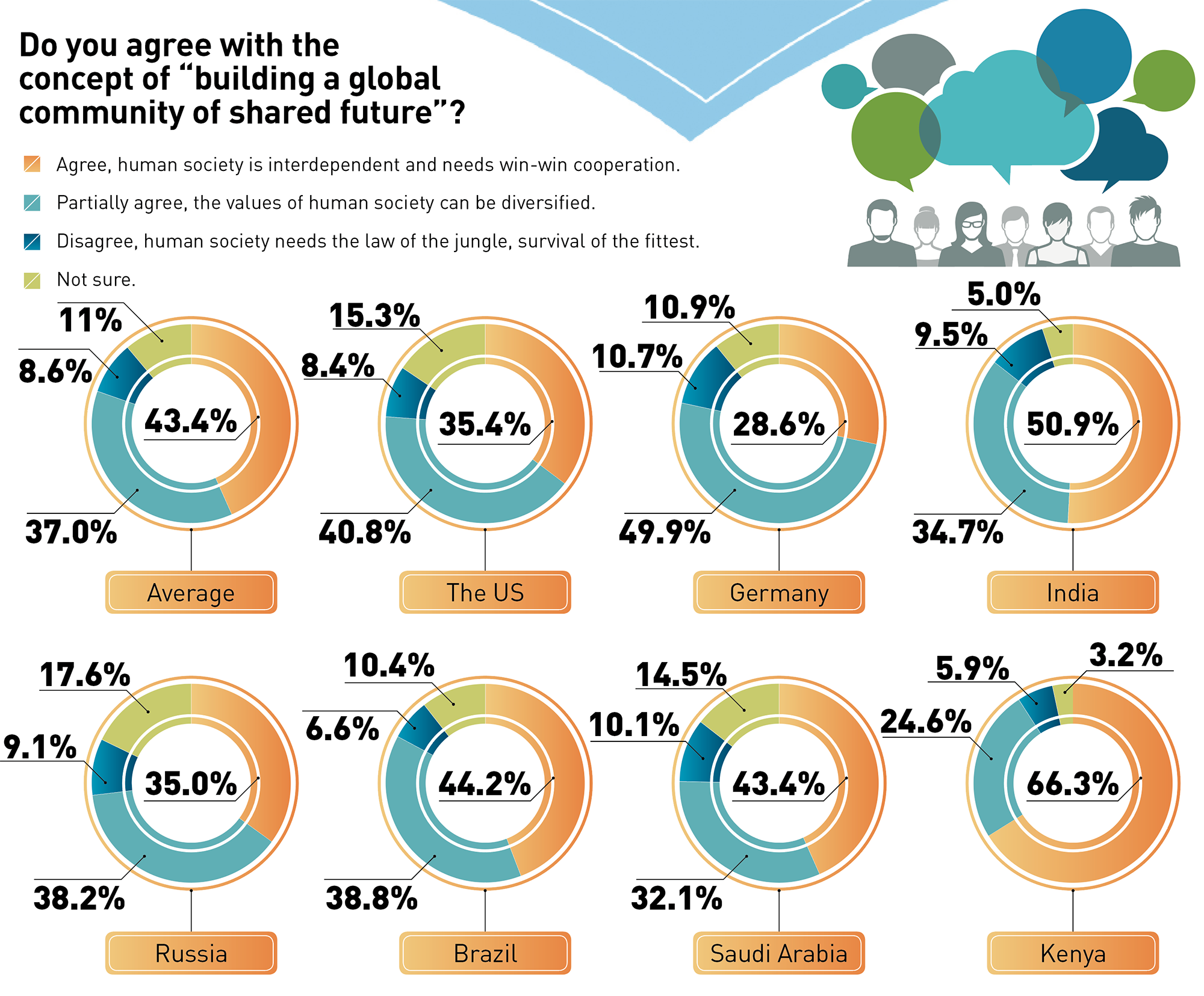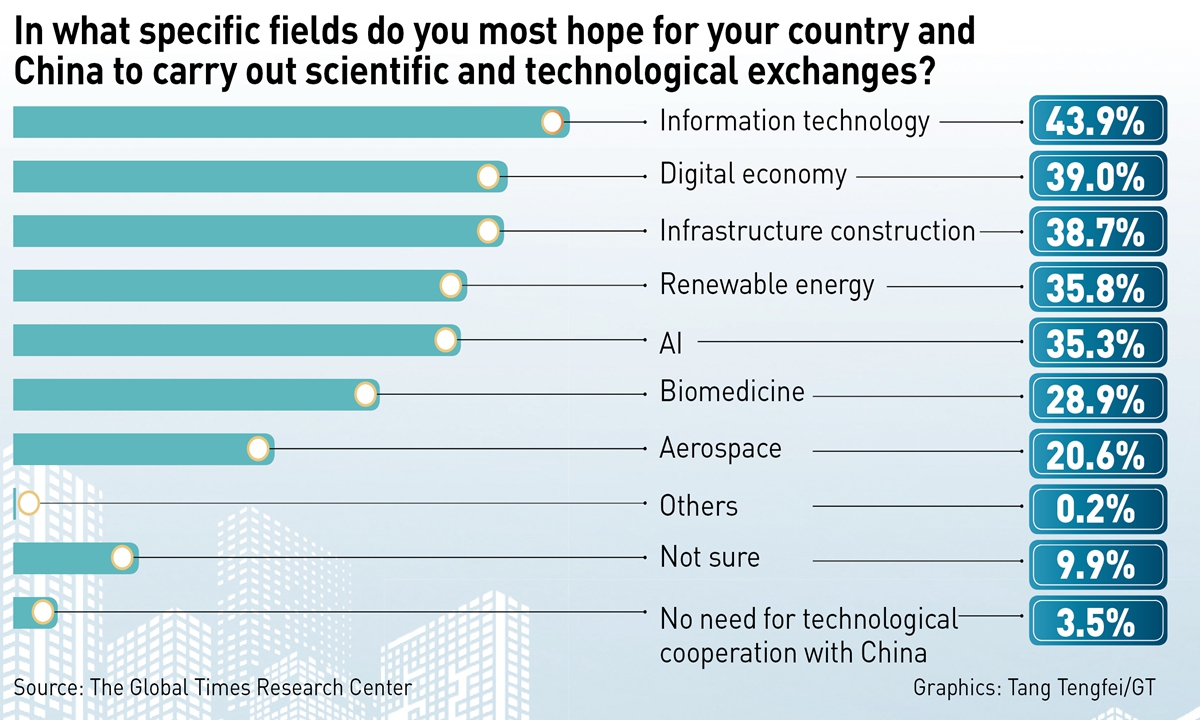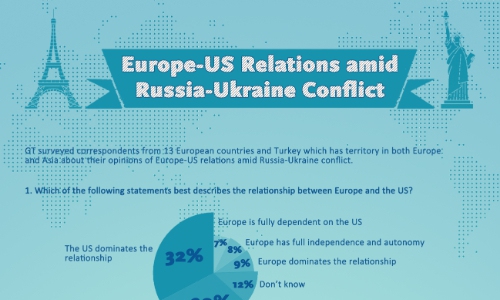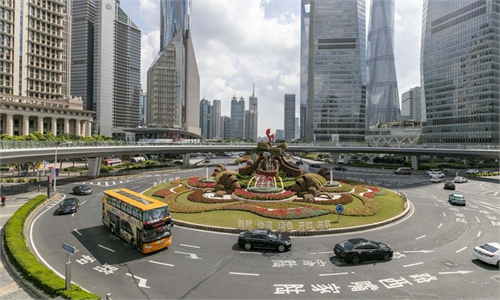IN-DEPTH / IN-DEPTH
Overseas youth show support for building a global community of shared future: GT survey
Youthful optimism

Photo: GT
The majority of overseas young people support the China-advocated concept of "building a global community of shared future," and support openness and win-win cooperation, a recent survey conducted by the Global Times Research Center has shown.
The survey was conducted among young people aged between 14 and 35 in the US, Germany, Russia, India, Brazil, Saudi Arabia, and Kenya. The collected 3,585 responses showed that, the vast majority of overseas youth look forward to scientific and technological exchanges and cooperation between China and their countries.
Additionally, although China-US relations are at times fractious, only a small number of the respondents think there are significant or irresolvable conflicts between the two, according to the survey.
Based on the poll result, the Global Times interviewed several young people from various countries, as well as Chinese and foreign scholars, to get their views on the global youth and their perception of China and the world, and what the poll results imply.
Chinese technology gets more attention
China's technology, culture, and food impressed international youth the most, followed by the Great Wall, development, population, industry, and economy, according to the poll.
When answering the question "what comes to your mind first when talking about China" in the poll, respondents from the US and Germany mentioned Chinese food most, and Indian respondents paid more attention to China's technology and manufacturing capacities.
Thorsten Heide, 29, is a technician at an auto company in Munich. He told the Global Times that his auto company has factories in China and that he has been seconded to China twice, making him a well-known "China hand" among his friends. Heide pays close attention to the development of the Chinese economy, especially the rise of the automobile industry. For instance, the recent push by Chinese car brands into Europe is something he feels only China can do so quickly.
Among the countries surveyed, Kenya had the highest proportion of respondents with a positive overall impression of China, exceeding 80 percent. In Russia, Saudi Arabia, and India, the proportions were around 70 percent. While it was less than 40 percent and slightly higher than 30 percent respectively in the US and Germany.
Kenyans' very positive attitude toward China comes from the fact that they have actually benefited from their exchanges with China, Mark Allan, a young Kenyan media professional, told the Global Times.
"Thanks to the Kenya-China partnership, many Kenyans have enjoyed direct and indirect benefits, from the improved road and rail infrastructure to the availing of higher education opportunities through scholarships provided by the Chinese government," Allan said.
"But the key reason is that China doesn't interfere in Kenya's internal affairs. In the past, Western countries like the US and the UK would offer aid in one hand and take away the power of choice from the people in the other, through the imposing of numerous rules which inevitably affected the country more than it benefited it," he stressed.
In Brazil, local youth told the Global Times correspondent that they are deeply impressed by China's long-term economic growth and social stability, and they hope that China's further development and its exchanges with Brazil will benefit their country.
Talking to many ordinary young Brazilians such as taxi drivers and shop assistants, the Global Times learned that the country's younger generation realizes there are huge market opportunities in China, which deserve to be explored further by Brazil.

Source: The Global Times Research Center Graphics: Tang Tengfei/GT
Over half recognized some Western media's biased reports on China
The majority of the respondents think that some Western media's China-related coverage is biased or has stereotypical views, the poll showed.
More than half of the respondents believe that there exists bias or even false reporting in some Western media's coverage of China. Therefore, apart from the media, today's younger generation also actively chooses diverse ways to learn about China, as 45.7 percent of the respondents are willing to get to know China through "internet searches," and 45.4 percent through "visiting China."
It is worth noting that among the seven countries, respondents in the US and Germany actually had relatively low levels of trust in some Western media's coverage of China, with some 60 percent believing it to be "biased or stereotypical" or "fabricated." Fewer than 20 percent of respondents considered the reporting to be "reliable and credible."
In Saudi Arabia, more than 50 percent of respondents believed that some Western media's China coverage is "biased or stereotypical" or "fabricated."
Overseas youth seem to be well aware of the long-term subjective and impartial coverage of China by some Western media outlets.
Heide believes that young people of his generation have a much deeper understanding of China than the previous generation of Germans, because they have access to Chinese knowledge through many other channels, including TikTok and other social media platforms. But European and American media sources are still the main way through which many educated young people learn about China.
Heide said that some German media's distorted reports made his friends and relatives prejudicial against China.
Alexandra, 26, a post-graduate student from Russia, told the Global Times that in recent years, Russian media sources have become increasingly positive and objective about China. The Russian media supports the Belt and Road Initiative (BRI), while some Western media sources have claimed it to be a trap. She said that according to her personal observations, the economies and people's livelihoods in relevant countries have greatly improved because of the initiative.
Mulunesh Demissie, an Ethiopian translator at a China-financed enterprise who learned the Chinese language in Nanjing, East China's Jiangsu Province, said she was impressed by Chinese people's punctual and hardworking characteristics.
Mulunesh Demissie finds that some Western media is biased or prejudicial not only in their coverage of China but also of Ethiopia.
The 25-year-old told the Global Times that she doesn't agree with Western media's accusations against China such as "China is colonizing Africa" or "the BRI is debt-trap diplomacy."
The poll results and feedback from some respondents were not surprising, observers said. Some Western media sources have already lost credibility thanks to their actions in recent years, and their coverage of China is getting more biased in order to portray China as a rival or enemy, said Zhang Yiwu, a professor of Chinese literature at Peking University.
Rainer Khill, an international politics scholar at a university in Berlin, Germany, told the Global Times that the narrative style of China-related reports by some Western media is bound to affect audiences' views on China. "But once people know the truth, they will trust those media sources less and less," said Khill.
Chinese wisdom highly respected
In general, about 80 percent of the respondents "agree" or "partially agree" with the China-advocated concept of "building a global community of shared future," according to the poll. Respondents from Kenya, India, Brazil, and Saudi Arabia highly agreed.
The poll also implied that many of the overseas youth are optimistic about possible future global changes. Most of them yearn for a world in great harmony, and support the ideas of openness and win-win cooperation.
"At present, when there is still much turbulence and many conflicts in the world, solidarity, mutual assistance, inclusiveness, and cooperation are increasingly needed, and that has become a consensus among the people in lots of countries, especially among the youth," Zhang said.
The China-advocated concept of "building a global community of shared future" clearly elaborates on the importance of the concept to the future prospects of human development and cooperation, and the world has witnessed the sound practice of the concept in recent years, Zhang said.
He added that BRI projects, for instance, have benefited many, and people, particularly in developing countries and emerging economies, have a real sense of this.
"Over the years, China's peaceful development advocacy, and its practice that matches words with deeds have been accepted and welcomed by more and more people globally," Zhang noted.
Alexander said the community with a shared future for mankind embodies the philosophy and wisdom of the Chinese people, and that young Russians are very much in agreement with them.
Concepts similar to the China-advocated "building a global community of shared future" are also popular in Ethiopia, according to Balew Demissie, an associate professor at the College of Performing and Visual Arts at Addis Ababa University.
"Most Ethiopians believe [all people in] the world shares a common destiny," Balew Demissie told the Global Times.
In the survey, more than 70 percent of the respondents expressed their willingness to work in the service of world peace and development.
The poll results show China's global influence, commented Balew Demissie. He said that China is promoting multi-polar global development, which is also changing the global economic and diplomatic order.

Source: The Global Times Research Center Graphics: Tang Tengfei/GT
Strained ties due to US' cold war mentality
In terms of China-US relations, nearly one-third of the respondents believe that there are "significant or irreconcilable contradictions [or conflicts] in ideology" between China and the US. More than half said China and the US "have a certain degree of conflict" in the field of ideology.
China-US relations keep changing and fluctuating by and large, Zhang commented. "There is not only competition and hostility in the relationship between China and the US-led West, but also mutual need and cooperation."
Nonetheless, "While China has made lots of efforts to promote cooperation in building a better world, it hasn't received a sufficient response," Zhang told the Global Times.
Speaking of China-US relations, Mulunesh Demissie believes that the two countries have entered a kind of "new cold war."
"The US is the richest country in the world, while China is rising fast. Afraid of being surpassed by China, the US tries hard to contain China's development," said Mulunesh Demissie, who added that "the US is primarily responsible for the deterioration of China-US relations."
"But I hope China and the US can work together to help Africa cope with many challenges, such as climate change and food security," she said.



